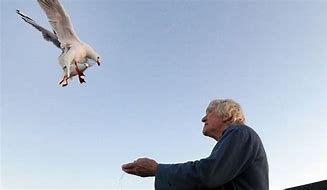Meet our guest contributor, Jeemes Akers, retired CIA officer, and friend of AIR.
THANKFULNESS
“O Lord that lends me life, lend me a heart replete with thankfulness.”
William Shakespeare
“I never met a bitter person who was thankful. Or a thankful person who was bitter.”
Nick Vujicic
Even in times of self-quarantine, time just seems to fly by. We are quickly approaching my two favorite holidays of the year: Thanksgiving and Christmas. It is one of the signs of the times, I suppose, that some stores have raced past Thanksgiving and their store aisles are filled with potential Christmas gifts. Critics see this as yet another indicator that we are living in an age of unbridled commercialism. At the same time, apologists will point to the pressures on retail stores by the twin forces of the pandemic and on-line shopping that has resulted—in the words of some commentators—a “retail apocalypse” in our country (more than 8,300 stores have closed in 2020 alone). Profit margins for some retail establishments have become so slim, so the logic goes, that stores are forced to extend the retail shopping season for the Christmas holidays. Plainly and simply, many (if not most) merchants and stores must turn a profit over the Christmas season to survive.
Perhaps it’s worth telling millennials that it wasn’t always this way. Remember the days when stores and malls (remember them?) waited until after Thanksgiving Day before launching into the Christmas frenzy? Remember when “Black Friday” shopping days involved only a handful of stores and actually waited until the early morning hours after Thanksgiving? Remember when there was only one televised pro football game on Thanksgiving? (Always featuring the Detroit Lions.) Remember when televised Christmas specials waited until after the Thanksgiving holiday? (Now my wife watches Hallmark Christmas movies in June.)
Sigh.
Those days—like pre-pandemic memories—are gone forever.
[expander_maker id=”8″ more=”Read more” less=”Read less”]
In preparation for this piece, I have been asking various folks around me—family and friends—for their special Thanksgiving Day memories. This past weekend, Imogene and I (with our grandson “Snapper” in the back seat) talked about our days at Alice Lloyd College when we would load up Kimberly in Ima’s white Corolla (later our blue Oldsmobile) and begin our annual Thanksgiving holiday trek by driving over Sizemore Mountain to Hi Hat, Kentucky. In that tiny Appalachian hamlet, amidst the smelly purplish haze of coal burning fireplaces, Ima’s mom (Hazel Bates) lived in a modest but cozy little house.
I think of Hazel every Thanksgiving.
She has been gone now eleven years (that doesn’t seem possible). Hazel was a fantastic cook (a trait shared by many mountain women): she could create a feast out of a seemingly empty refrigerator. But it was her preparation of a Thanksgiving meal that set her apart from other mortals. Hazel lived an extremely difficult life in a male-dominated mountain culture. I could tell several stories here but won’t. Suffice it to say, Hazel’s experiences in life left her, at times, very bitter; it hardened her personality and made it difficult for her to outwardly express her love in the form of words or gestures. We all learned to live with that. But on Thanksgiving, she packed all of her love for the entire year into one grand meal for her son, three daughters, grandkids and outlaw in-laws.
For several years, as one of the latter, I was a benefactor of that loving kindness.
If I close my eyes, I can still see Hazel (in later years bent over from back pain) standing over the small stove in a kitchen that was hotter than Smaug the Dragon’s tongue. So hot you would break out into an instant sweat upon entry. Hazel had been there cooking since dawn. She always wore a red bandana wrapped around her long, beautiful strands of gray hair. For Hazel, a hair in the food was the unpardonable sin. As were any unwashed hands that could possibly touch the food.
Several days prior to the meal, Hazel would have Madonna drive her to the local grocery (Olin Elliott’s Triangle Market in nearby Martin) where she would carefully select the choicest Bluegrass Ham, but only after inspecting the ham with the meticulousness of a scientist probing for the smallest disease pathogen in the laboratory. The same standard of care was applied to the purchase of a turkey, the potatoes, the shucky-beans (not a single blemish on the beans made it into the pot) and sweet potatoes.
For Hazel, only the absolute best would do for the family!
Hazel always served the Thanksgiving meal on the afternoon of Thanksgiving Day. And what a feast it was! Turkey, ham, mashed potatoes and gravy, cornbread dressing, shucky-beans, marshmallow-covered yams, macaroni salad, potato salad, cranberry and fruit salads, cherry Jello salad, cornbread and rolls. (In later years she would tolerate my invasion of the kitchen to make deviled eggs). The day before, Hazel prepared the desserts: homemade carrot cake, bunt cakes drizzled with orange marmalade and pumpkin cakes with cream icing. The result: a feast fit for Emperor Napoleon and his army! Yum!
Even now, these many years later, it makes my mouth water just to think of it. The kitchen counter was so crammed with food that we typically gathered in the living room (on card tables) to eat. Hazel, her skin glistening with perspiration, was often too tired from her herculean efforts in the kitchen to join us. She simply sat there on the couch, a bit of a smile on her face, vicariously enjoying the food carnage taking place around her.
That meal was Hazel’s definition of love.
If I stopped at only three plates of food, Hazel would ask me if I was sick or if something didn’t taste right about the food …
Later that evening, barely able to tuck my belly under the steering wheel, Imogene and I would put the kids in the back seat and head back over the mountain to the college campus.
Ah, the memories …
Sigh.
“Let all your thinks be thanks.”
W.H. Auden
Maybe it is hopelessly old-fashioned for me to make a plea for each of us to consciously pursue a mindset of thankfulness in these perilous times.
But here goes.
A true spirit of thankfulness—it seems to me—is most keenly felt in those whose hearts are softened to the things of God. The notion of being thankful (or developing a sense of thankfulness) is a constantly repeating theme in scripture. In the Old Testament, for example, when David offers thanks to God in the book of Psalms, the Hebrew word used to describe what he experienced is towdah (pronounced “to-daw’”), a concept related to the notion of extending one’s hands upward or outward in a sign of adoration and worship.[1] Unfortunately, in many of today’s churches, to raise your hands during the music or the service brands you as some sort of radical Bible-thumper determined to disrupt the calm decorum of the service.
So many churches, so little life.
Likewise, in the New Testament, when Jesus Christ offers thanks to Father God—or in several passages of Paul’s letters where thanks (or one of its derivatives) are used—the Greek word denoting that experience is euchrestos, meaning well-favored, and by implication, to be grateful or thankful.[2] Are you living a spiritual life that feels empty and powerless? Do your well-meaning prayers rise no higher than the ceiling? One of my favorite scriptural passages in Paul’s letter to the church believers at Philippi may explain why—“Do not fret or have any anxiety about anything, but in every circumstance and in everything, by prayer and petition (definite requests), with thanksgiving, continue to make your wants known to God.”[3]
As an earthly father, I cannot think of anything I would keep from my children (if it is within my power) if they approach me with a thankful heart. I am certainly less inclined to hear their request if it is couched as an entitlement demand or they have intentionally excluded themselves from my presence for long periods of time. Our Heavenly Father is the same way—if you go for prolonged periods of time without seeking a relationship with Him, never are thankful, or only come when you are in trouble or feel some sort of strange twinge in your body—He will be silent on your behalf. Even the most articulate prayers won’t move Him.
Most of you reading these missives know that I was a Chinese Mandarin linguist for the Air Force during the Vietnam years (to be perfectly honest, I have forgotten most of what I learned about the language during that period of my life). What has endured, however, is my love for the Chinese language in general and the linguistic characters in particular. Unlike our phonetic language (where letters represent sounds), Chinese characters in the written language are pictographic in nature. As a result, each character is a rich graphic representation of an idea. It gives the Chinese language a beauty, depth, texture, and uniqueness that our own language lacks.
Take the phrase Thanksgiving Day, for example. In Chinese, the concept is rendered with three characters. The first character is gan (third tone), a character with the heart radical on the bottom (in the Chinese thought world, the human heart is the seat of all life’s emotions); on top of the heart radical is a character for passion and emotion literally biting the heart. The idea is that a heart full of passion is a heart that is thankful. The second character en (first tone), means to give grace or favor. And the third character is jie (second tone), the character denoting a festival day.
Bottom line: the concept of thankfulness permeates every culture and tongue.
“When you rise in the morning, give thanks for your life, for your strength. Give thanks for your food and for the joy of living. If you see no reason to give thanks, the fault lies in yourself.”
Tecumseh
My final thought on thankfulness traces back to a campus convocation (at the College of the Ozarks) four years ago, just prior to the 2016 presidential election. During that presentation, I shared with the students my belief that seriously troubled times lay ahead for each of them in attendance that evening. I provided three strategies for surviving in future troubled times. My first point was the necessity of developing a mindset of thankfulness. To illustrate my point, I told them the story of Eddie Rickenbacker.[4]
Rickenbacker personifies what the American dream used to be: Rickenbacker was a genuine war hero (he was our country’s most decorated “ace” pilot during the First World War, recipient of the Medal of Honor and the French Legion of Honor); he was a prominent sports figure (an Indianapolis 500 race car driver and automobile designer); he was a pioneer in air transportation and successful businessman; a government military consultant; and, a humble man with a deep, abiding reverence for God. Eddie Rickenbacker died in 1973 and was buried in Columbus, Ohio. He died about the same time I was finishing my Air Force obligation at nearby Lockbourne AFB; indeed, while I was there, the base was renamed Rickenbacker AFB in his honor. His famous Spad XIII fighter aircraft is still on display there.
For the purposes of this missive, let me move the Rickenbacker story forward in time to October 1942. He was aboard a U.S. military aircraft (an old B-17D “Flying Fortress”) during World War II, on a secret mission for then Secretary of War Henry L. Stimson, including visiting various airbases in the Pacific and, reportedly, to deliver a personal letter of rebuke to General Douglas MacArthur. Unexpectedly, his aircraft was forced to ditch in the Pacific Ocean, hundreds of miles from land. Rickenbacker and the rest of the crew were adrift for thousands of miles, trying to stay alive while avoiding Japanese sea patrol planes. They drifted for some 24 days, clinging desperately to small rafts, buffered by the sea at night and trying to shield themselves from the intense heat during the day. Their food supply ran out after the third day. They rapidly used up what rainwater they could collect in homemade containers.
Finally, in desperation, Rickenbacker and the others cried out to God.
On the eighth day at sea, they spotted a solitary seagull on the horizon. The bird flew straight toward them and perched itself on one of the caps worn by a crew member. One of the men snagged the bird, then they tore off its feathers and ate the meat. They used the bird’s innards to catch fish.
To the end of his days, Rickenbacker considered the arrival of the bird as a miracle sent by God. They were so far from land that there was no reason for the bird to fly anywhere close to them.
In his later years, Rickenbacker consistently expressed his thankfulness to the birds—and to God—for the miracle of his survival.
Indeed, if you were a tourist or fisherman during the 1950s and 1960s visiting one of the many piers along the Florida coast, near Rickenbacker’s retirement home, you might catch a glimpse of him. He would arrive at sunset every Friday night at one of the piers. By then he was an old man, hunched over by age and shuffling along. On his head he wore the same old Air Force flying cap—now faded with age—that he had donned in the raft. He carried a bucket full of fresh shrimp purchased from a local bait shop.
Those locals who recognized him would deferentially make a way for him.
Swarms of seagulls, squawking and cawing, somehow expected him and instantly gathered in numbers that blotted out the setting sun.
At the end of the pier, Rickenbacker would reach into the bucket, grab a handful of shrimp, and then toss them into the air. The birds would dive and compete for each morsel.
Above the tumult, if you were close enough, you could hear his voice—now scratchy and diminished with the passage of years—repeating one message over and over as he threw the shrimp skyward.
“Thank you.”
“Thank you.”
During this special season of the year—despite the pandemic, official lockdowns, mask restrictions and media-scripted fears—I encourage each of us to slow down and focus on those many things for which we can be truly thankful. We need to stop dwelling on those things we don’t have.
May each of you make a special Thanksgiving Day memory with those you love.
Blessings.
[1] See James Strong, Abingdon’s Strong’s Exhaustive Concordance of the Bible (Abingdon, Nashville, 1894; forty-first printing 1981), #8426. Hereafter Strong’s.
[2] Strong’s, #2168.
[3] Philippians 4:6 (amplified version).
[4] In 2015, my former pastor Amos Dodge included the story of Eddie Rickenbacker in a sermon; I elaborated on his ideas in my convocation presentation.
[/expander_maker]




